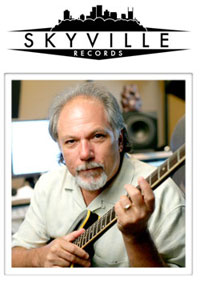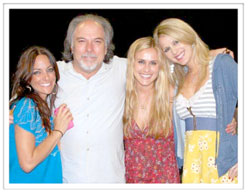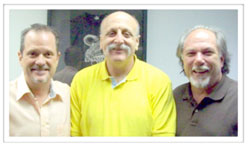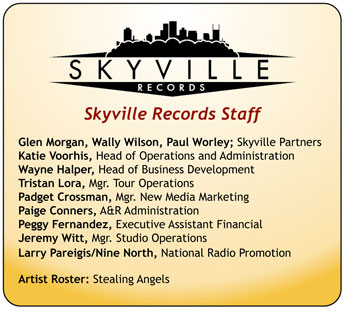
 Paul Worley’s music career now spans over 30 years. He’s served as a session guitarist, producer, publisher, label executive and more. But the Grammy-winning music man seems happiest in his current role. “The chair I’m sitting in now is the most comfortable of all,” he says. “I’m an independent producer, part of a label—Skyville, which is really also an artist development company, and involved in creating artist careers one at a time.”
Paul Worley’s music career now spans over 30 years. He’s served as a session guitarist, producer, publisher, label executive and more. But the Grammy-winning music man seems happiest in his current role. “The chair I’m sitting in now is the most comfortable of all,” he says. “I’m an independent producer, part of a label—Skyville, which is really also an artist development company, and involved in creating artist careers one at a time.”
Worley has worked with artists such as Martina McBride, Dixie Chicks, Sara Evans, Collin Raye, Big & Rich and Lady Antebellum plus many, many more. He’s served at Sony/ATV/Tree, Sony Music, Warner Bros. Nashville and reportedly been directly connected with over 50 No. 1 singles and a billion dollars worth of records sold.
A Nashville native, Worley fell in love with popular music during his high school years in the ‘60s. After some failed experiments with the clarinet and piano, he realized the guitar was his musical weapon of choice. After graduating from Vanderbilt University, he turned his full-time attention toward Music Row and began sharpening his skills as a musician, engineer and producer.
In 1999 Worley and long-time friend Wally Wilson formed what has become Skyline Music, and most recently expanded into Skyville Records. A few years later, while at Warner Bros. Worley reached a crossroads. He was super impressed with a young trio—Lady Antebellum—that Warner Bros. had been interested in, but ultimately signed with Capitol. He was also having self doubts about his career path and what lay in front of him. “I thought I was over as a producer and a musical entity,” he recalls. ”I thought I was irrelevant or soon to be. Time to make a big decision. I remember thinking these guys [Lady A] are too good. If I can’t be involved with a career like this, then I need to quit my job.” And that’s what he did, he left Warner Bros. “I didn’t choose to quit the music business, but I simplified things, pared it back to making music and just trusted that somehow I would be able to make a living.”

(L-R): Tayla Lynn, Skyville Records partner/producer Paul Worley, Caroline Cutbirth and Jennifer Wayne. The three ladies are collectively known as Stealing Angels. Wayne is the granddaughter of actor John Wayne and Tayla Lynn is Lorretta Lynn's granddaughter. The trio's single is "He Better Be Dead."
MusicRow caught up with Worley, at his Skyline/Skyville offices in Berry Hill. The following discussion includes observations about artist development, producing records and the record industry. It also details the future for Skyville Records as Worley and partners Wally Wilson and Glen Morgan introduce new female trio Stealing Angels to the country marketplace.
MR: What are some of your more memorable career moments?
Worley: A thousand things jump out and it’s all related to the artists and the music that I’ve gotten to work with over the years. The Dixie Chicks phenomenon immediately comes to mind. If you were around them in the beginning you knew they were good, but no one knew they would take such a big hold of things. Watching a really big career like that gear up, blossom and bloom was so exciting. Even when they were entertaining arena size crowds it was still very intimate and musical. And then to watch the career implode. That was a real ride. Another wonderful experience was getting to work with Martina McBride and the great songs she’s done. Her music—songs like “Concrete Angel,” “Love’s the Only House,” or “Broken Wing”—touches people and makes a difference in the way they approach their lives. It’s hard to build a career on songs like that. Much easier to just cut something commercial. Martina chose songs that spoke to her fans and allowed me to work on great material. And today with Lady Antebellum. Think about the words to the song “Run To You” which broke them wide open…It’s brilliant. The song is now moving up the pop charts a year after it climbed the country charts. There’s just so much you can be a part of through the pipeline of music. What a great life to get these kinds of opportunities.
I run from hate, I run from prejudice,
I run from pessimists, but I run too late
I run my life, or is it running me?
This world keeps spinning faster,
to a new disaster so I run to you.
When it all starts coming undone,
baby you’re the only one I run to…
MR: Producing records has changed since you first started behind the glass, especially technology’s thirst for perfection.
Worley: Is perfect perfect? The answer is, ‘Not always.’ But technology has evolved over the last 30 years to where it is much easier to perfect something in terms of timing and tuning, which when used properly is a good thing. What I’ve learned from doing it for so long is that emotion is still what motivates people. Emotion, like life, is not always perfect. So using those tools I’ve come full circle. Music was rehearsed in the ’50s, ’60s and ’70’s, whether it was big band with Sinatra to rock bands like the Kinks, the Stones, or the Beatles. The music was rehearsed so that there was a level of perfection to record. Multi-track recording then opened the door to actually creating music in the studio. So the history of the ’80s and ’90s was about music created in the studio. The musicians often had never heard the songs before and/or perhaps not even previously met the artist. You could build your tracks and arrange by editing out what you didn’t like after the musicians have left the floor. Along the way I know I lost track of rehearsing, the old school of “Let’s go figure it out in a rehearsal room first and then go to the studio to record.” What really brought me back to that was working with producer Peter Collins. I was still at Warners as an A&R person and the artist wanted me to play. Peter said, “OK we are going to rehearse,” and that reacquainted me with the beauty of that process which I’ve been doing ever since.
MR: Rehearsing enables you to create a richer, more customized texture to better fit the artist?
Worley: Absolutely. The band and the artist together can create the dynamic structure from the lows to the highs. The band is getting into the artist’s world, their body of songs, not just one song at a time. Practicing also creates familiarity with the lyrics, not just the chord and harmonic structure, which the musicians don’t get when they are isolated in a studio through headphones. I learned that studios are built for isolation not communication. We are all pros, and we’ve learned how to work through that wall of technology. But in the rehearsal room we are all standing on stage listening to one another, eyeball to eyeball. One of the most important things the players figure out from this interaction is what NOT to play. Play something that matters in the story that is being told in the song or sit on your hands and let the person that is carrying the ball have a clear field, don’t be ground clutter. Then when your point in the song comes, bring your game and matter.
MR: Visions and observations?
Worley: There is still a need for distribution and therefore major labels, whether it’s four, three or two. But everything else that a major label does can be done by individual entrepreneurship like back in the old days. Old A&R guys like Wally and me, have experience choosing an artist, implementing our vision and making the step-by-step incremental moves to develop a career. To properly put an artist through boot camp, you have to pay attention to the recorded music and how they come across live. I still believe in trying to create music and careers that capture the imagination of mass culture that are national in scope—large. Obviously radio is a big page in our playbook. You have to get radio to play you. How do you do that? Artist development. It’s about choosing and developing artists. Making sure that when you put your artist in a room—whether it’s a radio station boardroom, a room full of fair buyers, or a club full of people—that the artist is ready and can close the deal. It’s not about us closing the deal. Of course our involvement with the artists is 360. If you are going to create a career then you need to be completely involved. Is there a fair way to divide things up so the artist and investors are all satisfied? Yes of course. Skyville has created a great model with Stealing Angels.
MR: Conventional wisdom says now is a challenging time to start a new label. Yet that’s exactly what Skyville is doing. What prompted you to make that decision?
Worley: Stealing Angels is why we are in the label business. We started as an artist development company hung on a frame of publishing, but found out that small time publishing is too fragile a business right now to really support both. We looked at the passion we know exists for Stealing Angels and concluded we were the best partners for them. We saw the vision for what they are and could do in the marketplace and decided no one could do it better than us, so we became a label. But it was the artist that made us become a label, not the other way around.
MR: Are there plans to sign additional artists?
Worley: We have a couple of artists we are developing that could very well go down this road with us. One is a family called Henningsens and the other is a young lady, Kelleigh Bannen. We have an incremental artist development approach. We find talented people and it is required of them to come ask advice, then go out in the world, utilize it and grow. If they continue to grow then we continue to grow our commitment to them. It becomes pretty obvious when the artist finally reaches that point where they can walk in a room and win.
MR: Do you think some artists are singles based and others album based?
Worley: With Stealing Angels we’ve created an album, but started with cutting six sides and releasing four to get in business. In our mind we reserved some of the recording fund to watch them grow as artists and then possibly finish out the album. I’m not sure that you have to finish out an album. All along we considered the idea that we could just sell these six sides, but decided this time we would go ahead and cut the 13 or 14 sides we already have. Lady Antebellum’s deal is more traditional, they create and sell albums, but the digital downloads on “Need You Now,” for example, are selling through the roof. If you take the time and choose the right artists, the ones that can close the deal, then the fans will be happy to buy anything and everything they do.
MR: Shelf space is now a high priority major label concern. Is it a concern for Skyville?
Worley: Big box shelf space is shrinking. The business has imploded and either it will do that completely or it will make us utilize our tools more efficiently and create new business by making more imaginative music with better artists. When enough artists have created enough business the stores will open back up and give us their space. Skyville is a nuts and bolts, pop and mom approach, blessed to not be encumbered with huge overhead. We don’t have to sell a minimum number of pieces of business just to keep our staff busy. That is a problem the major labels have because they carry such high overhead.
MR: So what do the next months bring?
Worley: This summer is of maximum importance in all of our lives. We are right in the middle of unfolding Stealing Angels via a 30 week campaign. Their radio tour is underway and we’re two weeks into adds. It’s invigorating, scary and exciting, but I’ve never felt more alive. I get up every day really interested in what the day has to bring and that’s a gift in itself. As we move forward, we are only going to work with artists and promotion or distribution companies we are passionate about and that are passionate about us. That is key. We can talk business terms all day long, but it is a total waste of time if you are not coming from a place of passion.

About the Author
David M. Ross has been covering Nashville's music industry for over 25 years. dross@musicrow.comView Author Profile




